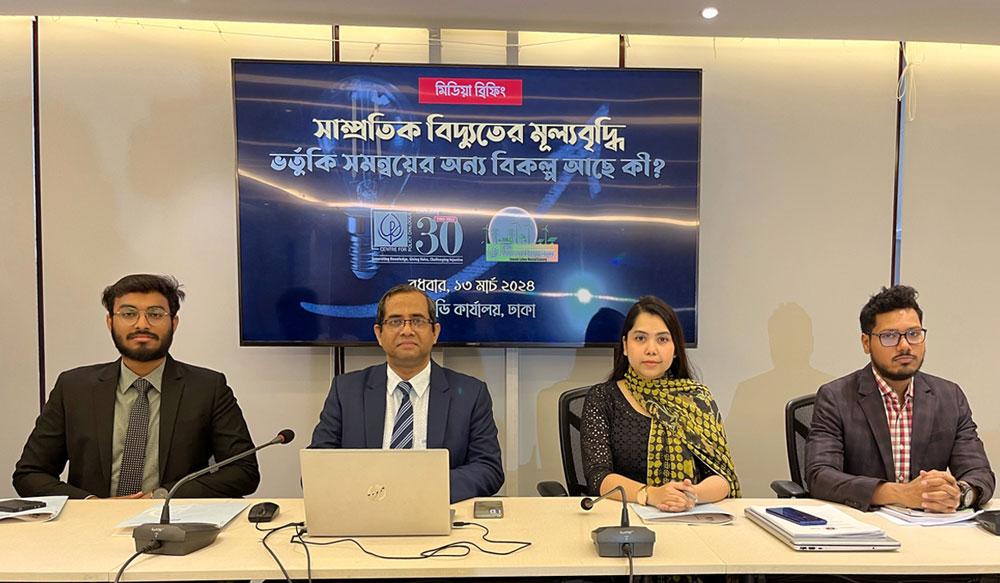
The Ministry of Power Energy and Mineral Resources (MoPEMR) has recently raised the electricity tariff (February 27, 2024). This upward adjustment of electricity tariff has been done as part of rationalising subsidy in the power sector. The decision aligns with the International Monetary Fund (IMF)’s conditions linked to a USD 4.7 billion loan, including the implementation of an automated pricing formula for petroleum and raising electricity and gas prices to reduce subsidies in the power sector. In this backdrop, the Center for Policy Dialogue (CPD) recommends four strategies to reduce electricity subsidies.
These four strategies emerged at a media briefing titled ‘Recent Electricity Tariff Hike: Isn’t there a better alternative for subsidy adjustment?’ on Wednesday, 13 March, 2024 at the CPD premises. The media briefing was based on a CPD study that examined whether a possible alternative for subsidy phase out is in hand instead of fully passing through to the consumers. The objective was to explore alternative strategies for subsidy adjustment that could mitigate the financial burden of the Bangladesh Power Development Board (BPDB), ensuring its commercial viability in the coming years.
During the keynote presentation, Dr Khondaker Golam Moazzem, Research Director, CPD, proposed a blend approach to reduce the subsidised amount paid to the BPDB without significantly increasing electricity prices or shifting the financial burden onto consumers. This approach includes ensuring the phased shutdown of power plants targeted by the government; avoiding any new capacity charges; imposing ‘no electricity, no payment’ conditions for electricity purchases, and competitive initiatives to procure electricity through open tenders.
‘According to CPD’s calculations, this approach could eliminate subsidies by 2028 and create a positive surplus for the BPDB’, said the Research Director. He elaborated that the strategy aims to curtail the electricity price hike to just 6.8 per cent over five years, striving towards a subsidy-free scenario, contrary to the IMF’s projection of a 12 per cent increase over the same period. Ultimately, this strategic framework is poised to substantially alleviate the fiscal burden while advancing sustainability in the energy sector.
While discussing the due to procedural and policy weaknesses, Dr Moazzem said, ‘The losses originate from the procurement of electricity at exorbitant costs, which are dictated by the fuel type utilised in the generation process’. He remarked that relying on LNG, furnace oil, and diesel for electricity generation has resulted in price hikes, exacerbated by soaring international fuel prices, consequently driving up domestic electricity costs.
He further elaborated that the expansion of capacity has far exceeded the growth in electricity consumption by a significant margin. While capacity has skyrocketed by double digits, consumption has only experienced single-digit growth. This growing gap has been widening since 2018, presenting a notable challenge, especially with capacity payments emerging as a major concern for the government.
Dr Moazzem emphasised the lack of competition in electricity procurement, which contributes to the escalation of prices. He also noted that power procurement in Bangladesh currently lacks a tender process, relying instead on negotiated pricing. Transitioning swiftly to competitive tendering, he suggested, could result in cost reductions.
The briefing was followed by a Q&A session with journalists from print and electronic media.


